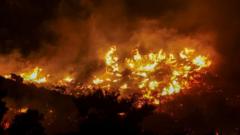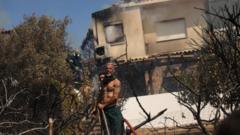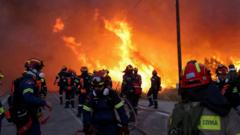As the election date approaches, the battle for leadership in the International Olympic Committee (I.O.C.) unveils both ambition and unique challenges facing the candidates.
The Intrigue Behind the I.O.C. Presidential Race

The Intrigue Behind the I.O.C. Presidential Race
Seven Candidates Compete in the Secretive Election for the President of the International Olympic Committee.
In a dynamic prelude to the upcoming March 2025 election for the presidency of the International Olympic Committee, seven ambitious officials are vying for the influential role that governs the prestigious global event, the Olympics. The election’s behind-the-scenes intrigue and strict regulations have generated commentary from candidates and observers alike.
During a recent insider dinner at the Olympic Museum near Lake Geneva, members of the I.O.C. were treated to candidate presentations while being shielded from interactions with them, reminiscent of a closed church conclave. Outgoing president Thomas Bach, noted for his dry humor, felt this arrangement allowed members to dine peacefully, unmarred by political discussions. While the exclusivity of the process is a long-standing tradition, many candidates voice concerns over the constraints imposed by the I.O.C. electoral rules that stifle public discourse and limit communication.
Among the contenders is Prince Faisal bin Al Hussein, the only royal participant, who emphasized transparency in a climate where candidates cannot openly challenge each other or participate in debates. His fellow candidates include notable figures such as Juan Antonio Samaranch Jr., Sebastian Coe, and Kirsty Coventry—the latter marking a historic moment as the first female candidate and potential leader from Africa.
As candidates are presented individually to members in a tightly controlled environment, their ability to convey their messages effectively is significantly hindered. This has resulted in a political landscape described by some as archaic, limiting the engagement of members and curtailing the candidates’ outreach efforts.
The I.O.C., comprised of 110 diverse members drawn from sports, politics, and business, is viewed by some as a “private club” where critical decisions including Olympic host selections are cloaked in bureaucracy and secrecy. Although there are cries for greater involvement from members, many candidates find themselves bound by rules that echo the I.O.C.'s past tradition.
With significant challenges ahead, including negotiating major television deals and resolving doping disputes, the candidates are racing against time to establish connections and sway votes before the election. As they navigate this unique electoral landscape, the outcome could redefine not just the leadership of the I.O.C., but also potentially reignite necessary transparency and dialogue within the organization's ranks.
During a recent insider dinner at the Olympic Museum near Lake Geneva, members of the I.O.C. were treated to candidate presentations while being shielded from interactions with them, reminiscent of a closed church conclave. Outgoing president Thomas Bach, noted for his dry humor, felt this arrangement allowed members to dine peacefully, unmarred by political discussions. While the exclusivity of the process is a long-standing tradition, many candidates voice concerns over the constraints imposed by the I.O.C. electoral rules that stifle public discourse and limit communication.
Among the contenders is Prince Faisal bin Al Hussein, the only royal participant, who emphasized transparency in a climate where candidates cannot openly challenge each other or participate in debates. His fellow candidates include notable figures such as Juan Antonio Samaranch Jr., Sebastian Coe, and Kirsty Coventry—the latter marking a historic moment as the first female candidate and potential leader from Africa.
As candidates are presented individually to members in a tightly controlled environment, their ability to convey their messages effectively is significantly hindered. This has resulted in a political landscape described by some as archaic, limiting the engagement of members and curtailing the candidates’ outreach efforts.
The I.O.C., comprised of 110 diverse members drawn from sports, politics, and business, is viewed by some as a “private club” where critical decisions including Olympic host selections are cloaked in bureaucracy and secrecy. Although there are cries for greater involvement from members, many candidates find themselves bound by rules that echo the I.O.C.'s past tradition.
With significant challenges ahead, including negotiating major television deals and resolving doping disputes, the candidates are racing against time to establish connections and sway votes before the election. As they navigate this unique electoral landscape, the outcome could redefine not just the leadership of the I.O.C., but also potentially reignite necessary transparency and dialogue within the organization's ranks.





















